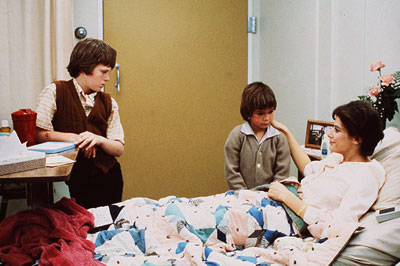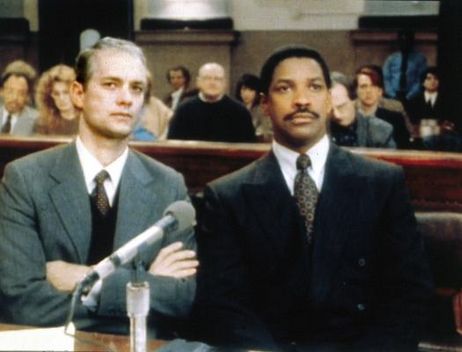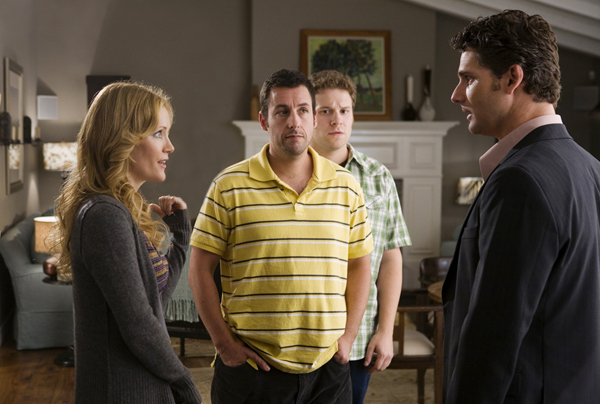Perhaps this point could be debated, but nothing is more cruelly unfair than serious illness. You can blame murder and war on people, but unless you’re a conspiracy theorist, you can’t sanely blame anyone when someone develops cancer or a similarly vile or fatal illness. Yes, some are preventable, but many simply aren’t.
Depressed yet? Hollywood is. You might be able to name tons of films where someone has such an illness, but few shine a spotlight on it and those that do twist it to a more public friendly genre. People don’t go to the movies to watch two hours of the stuff that already has or might ruin their lives, at least that’s what most studios think. And while they’re right, that doesn’t mean these subjects are incapable of providing a positive film experience — or even entertainment. From what we know about the new film 50/50, that would seem to be the goal.
Of course 50/50 is not the first film to tackle terminal or potentially fatal illness (not even this fall, as Gus Van Sant recently released Restless), but it might be the first of its kind in terms of the specific angle. Most Hollywood uses of serious illness can fall into three categories; here’s to hoping 50/50 can break these traditional lines.

Illness as Used to Add Emotional Weight to an Oscar Contender
There’s little gray area when it comes to dramas that have serious illness as one of the focal points; it’s either go Oscar or go home. A sad illness tips the emotional scales of an already weighty drama and it either falls on the side of “my God give them/him/her an Oscar! And uh ... pass the tissues” or “That was a bit too much — not a fan.”
One of the biggest most prominent examples is James L. Brooks’ Terms of Endearment. At first it seems like it will be a family drama about the unusual relationship between a mother (Shirley MacLaine) and daughter (Deborah Winger) as the daughter gets married and starts her own family. Then seemingly out of nowhere, Brooks drops a C-bomb that explodes all over the film. At first it seems like a gimmick, but eventually you see how it magnifies the existing relationships and conflicts that Brooks has spent hours building. All that translated to 11 Academy Award nominations and five wins, most highly deserved, but some undoubtedly bumped up thanks to cancer.
As for your Oscar chances if you’re playing a character with a terminal illness — gold. I don’t think you can fault me for saying a dying character rates second only to a disabled character when it comes to hailed performances by actors and actresses coping with tangible obstacles. With that in mind, it should come as no surprise that Tom Hanks won back-to-back Best Actor Oscars for playing one of each.
Hanks’ first statuette came for his role in Philadelphia, Jonathan Demme’s five-time nominated drama about a lawyer laid off from his big-time Philadelphia-based firm right after receiving a promotion. He learns it was because the firm found out he had AIDS, so he files a wrongful dismissal case that an up-and-coming yet homophobic civil attorney (Denzel Washington) agrees to take. Hanks gives a powerful realism to the debilitating effects of AIDS, and the way the script takes aim at our prejudices about AIDS and homosexuality makes it a troubling film, but it’s not at all without a positive outlook.

Illness as an Emotional Sucker Punch in a Romance
Many romance films are well-loved, but don’t have the hardware to prove they belong among the all-time best. Half the films that fall in that general description usually have a some kind of hopelessly tragic element, often times in the form of a terrible disease. These low jabs at our tear ducts might be cheap, but they can be damn effective, especially if you tend to not have a Y chromosome.
Novelist Nicholas Sparks might be the all time champion of the emotional sucker punch. In The Notebook, which could rightfully be considered the best romance in the last 10 years, he depicts an old man telling a love story to a woman in a nursing home, only to reveal that they are the lovers in the story and she can’t remember because of the severe nature of her Alzheimer’s. Nope, that’s not a terminal illness — Sparks saved that for A Walk to Remember. I never saw the film starring Mandy Moore and Shane West, but what I did manage to hear about was the story’s big twist, that West’s character Landon, after falling for Moore’s Jamie, learns that she has terminal leukemia. The ill-fated lovers must come to terms with said ill-fate.
This is where we could learn a lesson from Romeo & Juliet. Shakespeare’s classic tells a profound tale of star-crossed lovers, but I don’t recall the part where Juliet learns she has a couple fortnights to live after contracting the Plague.
If I sound like I’m speaking lightly of something that’s touched many lives, I do apologize. Truth of the matter is these things happen in some regard, but it would be ignorant to ignore the smell of Hollywood cooking up these painfully life-like tales in a way that makes them all the more heart-wrenching.
One example would be Stepmom, the 1998 film starring Susan Sarandon as a woman who must cope with her divorced husband’s (Ed Harris) new wife (Julia Roberts) as must her two children (Jena Malone and Liam Aiken). The whole game changes when Sarandon’s character comes down with possibly fatal cancer. The film won audience approval (I recall enjoying it as a tween), but critics tore into it for being a contrived tearjerker. 
The sucker punch works the best when the film doesn’t try to be too real. Take Moulin Rouge!, for example. When we discover Nicole Kidman’s alluring entertainer Satine has developed Consumption and starts coughing up blood, we know her time with Christian (Ewan McGregor) will be short, regardless of the intentions of the Duke among others. Death begins to creep in just as they seem to have beaten the rest of the odds, a cheap shot to be sure, but why it works is because the entire film aspires to be a grandiose love story of unrealistic proportions. Whatever can strengthen the emotion of that love story could and should be used.

Illness as Cheap Motivation for Characters to Make the Most of Life
At first thought, you wouldn’t believe any film that involves fatal illness as a crucial plot element could possibly be a comedy, but you would be oh so wrong. Most of these films are in fact recent, using a main character’s terminal illness diagnosis to jumpstart an entire film plot, generally with the intention of showing them try to live life to the fullest, which involves doing “funny” things.
The first to come to mind would be Rob Reiner’s 2007 comedy The Bucket List starring Morgan Freeman and Jack Nicholson as a pair of old men who escape a cancer ward for the terminally ill in order to do all the things they wanted to do in life but never did, or cross them off their “bucket list.” Together they travel the world, skydive, drive race cars — all manner of adrenaline-boosting things that people never do when they have their whole life ahead of them. All this so that you really like them and when the inevitable happens, you shed a tear or several. Like Stepmom, the film didn’t earn favor from critics, but audiences ate it up, especially on DVD — it’s still one of Netflix’s most rented films.
The cheapest of the cheap would be Queen Latifah vehicle Last Holiday. Latifah’s character lives the simple life and hasn’t ventured out of her comfort zone in New Orleans ever, but a CT scan reveals she has a three weeks to live, so she goes to Europe, rents the presidential suite at one of the nicest hotels and decides she has nothing to lose. I didn’t see this film, but the trailers emphasize comedy above all else, as if to say a fatal diagnosis gives a film free license to have its character be over-the-top.
Perhaps the only attempt that feels anywhere near Friday’s 50/50 is Judd Apatow’s Funny People. Adam Sandler plays a stand-up comedian named George Simmons who learns he has a rare form of leukemia, which causes him to contemplate his life choices. He ends up hiring a joke writer in the form of a promising young comedian (Seth Rogen), who ends up being more of a personal assistant in keeping him company. The catch here is that George finds out he’ll live earlier on in the film (it was even in the trailers). The use of cancer has little ultimate bearing on the film, just on George’s perspective. He doesn’t use it as license to go crazy; it seems to have little point to being part of the plot, yet it’s the whole plot. Perhaps the bitterness comes from the fact that the film wasn’t anywhere near as funny as you’d expect from Apatow and the movie found very few fans.
If 50/50 is to avoid this category and carve its own place in the landscape of films dealing with terminal illness, it will need to avoid using it as a crutch and let it naturally soak into whatever other conflicts exist. We already know it won’t use cancer as a sucker punch, so things are looking up.